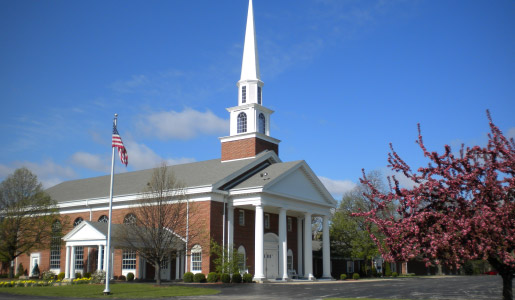The Congregational Foundation for Theological Studies
The Congregational Foundation for
Theological Studies

Our Purpose
To support seminarians in their educational quest for leadership in churches and ministries of the National Association of Congregational Christian Churches. Graduates of the Congregational Foundation for Theological Studies (CFTS) are uniquely prepared to meet the challenges of today’s churches through the vibrant traditions and practices of the Congregational Way.
About the Program
Congregationalism has a long and honored tradition of a well-rounded, educated clergy. Seminary training at an accredited institution is the preferred way for ministerial candidates to receive such an education. CFTS was established by the National Association of Congregational Christian Churches (NACCC) in 1961 as an alternative to founding its own seminary, investing in people rather than brick and mortar. Recognizing that no one seminary can provide Congregational churches with the variety of leaders and theological viewpoints needed for ministry in our diverse congregations, students attend seminaries that are accredited by the Association of Theological Schools (ATS) and engage in Congregational studies and experiences through CFTS.
Program Overview
Steps to Earning a Degree
A Master of Divinity degree (MDiv) is the recognized degree for pastoral ministry and usually requires three years of full-time study for completion. Many of those entering ministry today are second or third career people with familial responsibilities. Consequently, it is common for students to take four or five years to complete their Master’s degree. Many do so while in the employ of a church. For those who have not yet earned the prerequisite bachelor’s degree, several ATS seminaries allow individuals to work on a Bachelor’s and Master’s degree concurrently. This usually requires one or two additional years of course work, depending on the amount of uncompleted undergraduate work at the time of enrollment in seminary.
Answering God’s Call to Ministry


Application Requirements

Requirements and Applications
Requirements and Application to CFTS
General Requirements
Entrance Requirements
Along with an application form, several official documents providing evidence of church membership and involvement, educational background, and the support of the church and its leadership for the pursuit of seminary education must be submitted, along with letters of reference and completion of a consent form to enact a background check. All of these items are detailed on the application.
Additionally, one must be enrolled in seminary at least half time and complete one’s degree requirements in a timely manner. The CFTS Committee and/or Director of Programs may waive existing requirements or make additional requirements when accepting students. All applicants are encouraged to discuss recommended seminaries with the Director of Programs prior to formal enrollment.
Program Requirements
Once accepted to the CFTS program, one is obligated to participate in the educational programs provided by CFTS. The cost of these opportunities is borne by the CFTS program. Those include:
- Completion of the directed study in Congregational History and Polity
- Participation in the Congregational History and Polity Seminar and submission of a graduate-level research paper
- Completion of the equivalent of a 1000 hour Supervised Ministry practicum. One unit of Clinical Pastoral Education (CPE) may be recommended by the Committee and/or Director of Programs and may count toward some of the hours toward the Supervised Ministry requirement.
- Participation in three CFTS sponsored education and fellowship events in addition to the History and Polity Seminar
A 3.0 Grade Point Average (GPA) must be maintained throughout a student’s time in seminary and transcripts must be submitted to the Director of Programs after each completed semester. There may be other requirements indicated by the CFTS Committee and/or Director of Programs.
How to Apply
The first step is to contact the Director of Programs, who will send electronically an initial application request form and information.
There is a thorough process engaged in reviewing applications and supporting documents, and an interview with the Director of Programs and representatives of the CFTS Committee, either in person or virtually by means of technology as deemed convenient and appropriate, is arranged once this has been completed.
Rev. Dr. Gerald B. Krupp
Director of Programs
Financial Support
![]()
Financial Support for CFTS Students
As a general principle, financing a seminary education is seen as the responsibility of the student. CFTS is one source of financial assistance and counsel.
Fellowship Awards
Any person who accepts an invitation to become a CFTS student, agreeing to meet its educational requirements, is accorded “fellowship” status. Every student admitted to the program generally receives a small fellowship grant per year for a limited number of years.
Scholarships
CFTS administers several scholarships on behalf of churches, regional associations, and individuals who have made generous donations to the program. All CFTS students are eligible to apply for these scholarships. They are awarded at the discretion of the CFTS Committee in consultation with the Director of Programs, upholding the donor’s intent. The amount available for scholarships varies yearly, depending upon donations and market performance.
Post Graduate Grants
CFTS offers postgraduate grants to students who, upon graduation, secure ministry in an NACCC member church. Grants are awarded by application to the Director of Programs and CFTS Committee if received within the first three years after CFTS graduation.
CFTS Directed Study on Congregational History and Polity
There are two main components of the directed study: (1) the directed study in which students complete readings from a provided book list and submit required papers; (2) attendance at the Boston Seminar for Congregational History and Polity. The goal of each is to provide students with a strong background in the tradition in which ministries will be practiced.
The broad learning objectives of the Directed Study are to help students:
- gain a working knowledge of the history of Congregationalism
- understand the Separatist and Puritan theology and influences on Congregationalism
- translate the knowledge of Congregational history and polity into praxis
- demonstrate scholarship when engaging Congregational tradition
During a portion of the Directed Study, students spend 5 days in Boston. They visit Plymouth, Massachusetts, and spend time at the Congregational Library and Archives for research. There are gatherings in the evenings to explore issues of praxis in Congregational ministry.
Future Leaders
Supporting Future Leaders through CFTS
CFTS is the only program in existence today with the sole purpose of preparing men and women for ministry in churches committed to the Congregational Way. This is accomplished under the close supervision and support of the Director of Programs and the CFTS Committee. Almost 200 men and women have received academic and financial support and completed their training as CFTS “Fellows.” They have made a lasting impact on continuing Congregationalism.
You can make a difference
Identify gifted people
Make a contribution
By investing in leadership today, together we can ensure a bright and vibrant future for the churches of the Congregational Way.

Rev. Dr. Gerald B. Krupp
Director of Programs
Connect with the NACCC Team
If you have any questions or would like to know more about the NACCC, please send us a message. We look forward to hearing from you!
